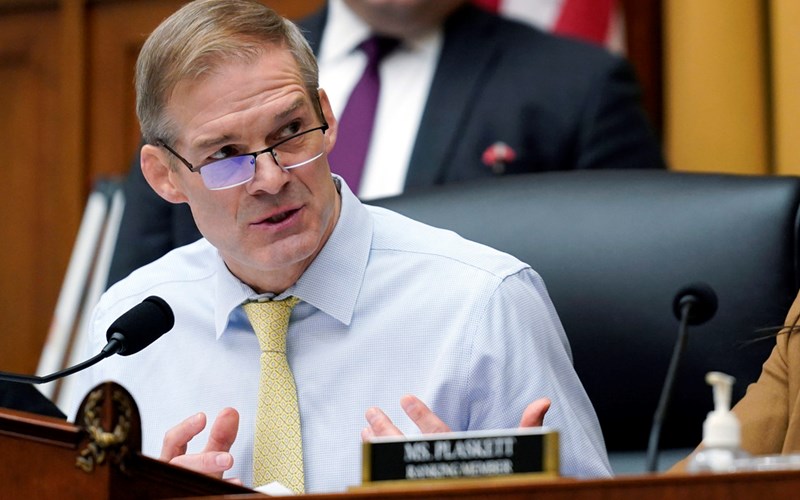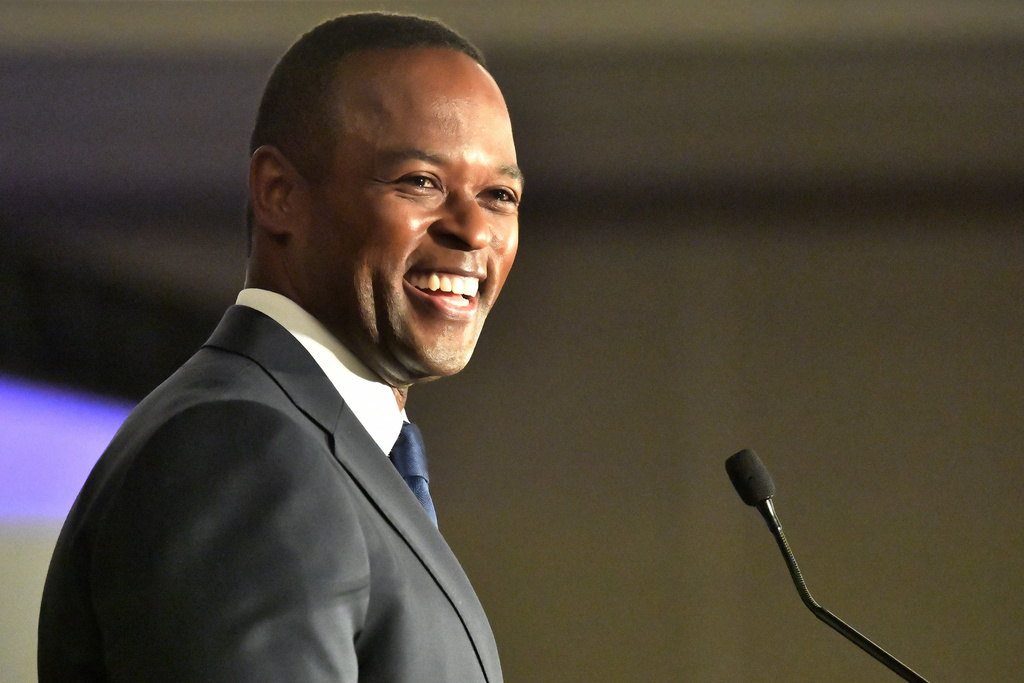Read the full report from whistleblowersFBI Whistleblower Testimony Highlights Government Abuse, Misallocation of Resources, and Retaliation |
Last week's report by Special Counsel John Durham concluded the nation's top law enforcement agency had no grounds to open its investigation into alleged collusion between then-presidential candidate Donald Trump and Russia in 2016. Today, several whistleblowers from the FBI who were interviewed by Republican members of the House Select Subcommittee on the Weaponization of the Federal Government spoke before the entire subcommittee. They told stories of politically motivated corruption, confirming the spirit of Durham's report, and they also spoke of retaliation against them personally when it was learned they were talking to the Committee.
"Politics is driving the agenda in far too many of our federal agencies," subcommittee chair Jim Jordan (pictured above) said Thursday morning. "Today it's worse. It's not just going after presidential candidates. Today, it's the American people. If you are a parent attending a school board meeting, you're a pro-lifer praying at a clinic, or you're a Catholic simply going to mass, you are a target of the government, a target of the FBI."
For FBI employees willing to air the Bureau's dirty laundry, it's much worse, according to the Ohio lawmaker.
"If you're one of the thousands of good employees, brave whistleblowers willing to come forward, if you're one of these folks willing to talk about what's going on out there, you get attacked. They will try to crush you," Jordan said.
Making it hard on the whistleblowers
FBI employees Garrett O'Boyle, Stephen Friend, George Hill and Marcus Allen spoke to the House Judiciary Committee today, telling stories of personal attacks and of pressure from the Washington Field Office to steer cases a certain direction – or flat-out break laws.
It's been confirmed that the FBI infiltrated Catholic churches and worked to cultivate sources for information on what it called "violent extremism." Also confirmed is a memo by Attorney General Merrick Garland that instructed the FBI to target parents who spoke out at school board meetings in Loudoun County, Virginia.
"It's like a cancerous point where the FBI has let itself become enveloped in this politicization and weaponization that I don't how to even begin to fix it," O'Boyle said.
Friend and O'Boyle both lost security clearances and were suspended without pay after talking to the committee. Both went outside the FBI only after expressing concerns through the chain of command but seeing their beliefs strongly opposed with no actions taken.
Friend had concerns about how certain cases managed, saying he believed the FBI was trying to manipulate crime statistics. He also spoke out against the use of a SWAT team to bring in a Jan. 6 suspect who he said had shown willingness to cooperate with the FBI.
Friend told the committee he was suspended in the middle of his transfer from Kansas to Virginia and with the belongings of he and his pregnant wife stuck in an FBI-controlled storage unit.
Friend was trying to get a law enforcement job but was denied access to his firearms training records, Jordan added. Friend told a committee interviewer that he was concerned about the possibility of being put under investigation because he spoke out at a local school board meeting.
"Yes, my colleagues teased me about it," he said.
Allen, a decorated former Marine, was suspended without pay for performing tasks he said were a regular part of his job. He testified that part of his job was "all-source analysis" in which he would research information freely available to the public online. While reading open-source news stories and watching open-source videos, Allen said he sent links to co-workers to improve "situational awareness" related to the FBI's investigation of Jan. 6.
The information forward by Allen, though, was critical of the FBI's handling of events at the Capitol. Allen testified that he was suspended for "conspiratorial views in regard to the events of Jan. 6."
Hill, an intelligence analyst at the Boston Field Office (BFO), said his office felt pressure from the Washington Field Office. He told the subcommittee that two individuals organized a bus trip from Massachusetts to Washington on Jan. 6, 2021. The group included a total of 140 people on two buses. The two organizers, he said, entered restricted areas when crowds marched on the Capitol that day, and the BFO opened cases against those two for potential federal law violations. That wasn’t enough for the WFO, which instructed the BFO to open cases on all 140 people who attended the rally.
According to Hill’s written testimony, "The SSA [Supervisory Special Agent] in Boston said, 'They were going to a political rally which is First-Amendment protected activity. No, we're not starting cases on these people.' To which [WFO] said, 'Well, we’re going to call your SAC [Special Agent in Charge].' The SSA said, 'Go right ahead.'"
Hill said the Boston agent asked WFO agents to show him video footage of the Massachusetts individuals alleged to have entered restricted areas at the Capitol. The WFO responded, "We can’t show you those videos unless you can tell us the exact time and place those individuals were inside the Capitol."
The Boston SSA responded, "Why can’t you show us? Why can't you just give us access to the 11,000 hours of video that’s available?"
The WFO replied: "Because there may be UCs [undercover officers] or CHSs [confidential human sources] on those videos whose identity we need to protect.”
Hill testified that he was present to hear that conversation.
Stat-padding to mislead Congress
Likewise, O'Boyle – a staff operations specialist with the FBI – said his field office felt pressure from the WFO to open cases against certain individuals.
"I received a lead about someone based on an anonymous tip – and in law enforcement, anonymous tips don't hold very much weight, especially without evidence that you can corroborate pretty easily," O'Boyle said. "I wasn't able to corroborate anything they said even after speaking with the person; they alleged of some potential criminal behavior."
Perhaps sensing reluctance from O'Boyle, WFO personnel approached him with another "tip."
"While I'm trying to figure all that out, I get another lead from the same agent who sent me that lead. They essentially tried to get me to violate policy or law," O'Boyle said.
O'Boyle said the FBI would try to mislead Congress on the reality of the threat of domestic terrorism with creative record-keeping. He used the example of investigating one gang of suspects that might pose an actual terror threat. Instead of creating one case file with information on all alleged gang members, as is protocol, O'Boyle was encouraged to create case files on every alleged gang member.
"Then they can say, 'Well, he actually had four [cases], so give us more money because look at how big of a threat there is with all this domestic terrorism,'" O'Boyle said.
Editor's note: This story was updated during and following the whistleblowers' testimony before the House subcommittee.







